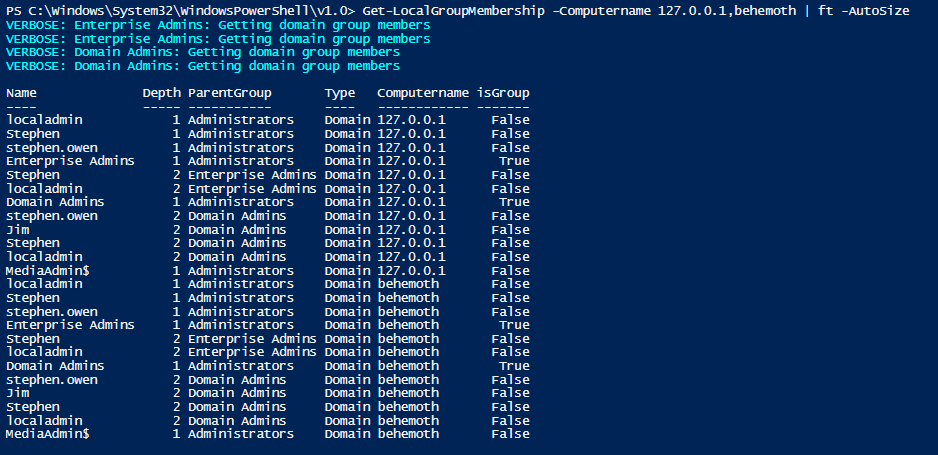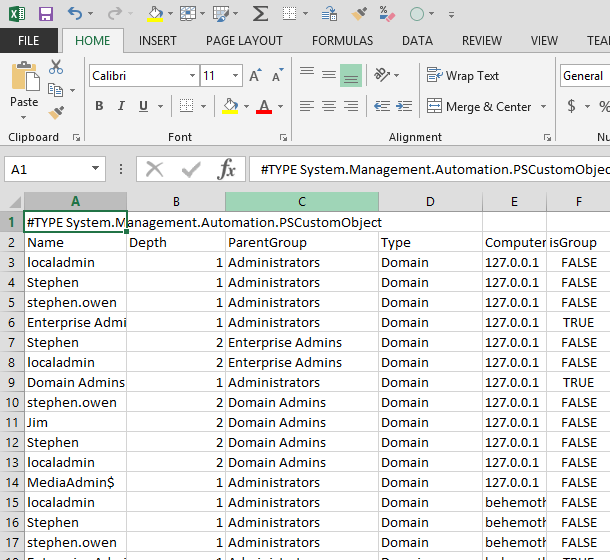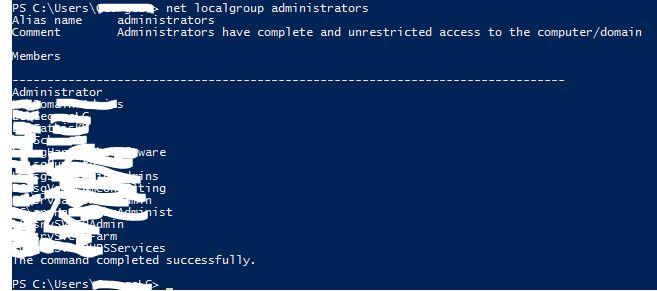Получить учетные записи локальных администраторов на каждом компьютере в подразделении
Я пытаюсь получить список всех учетных записей пользователей в группе администраторов на их уважаемых машинах, всего нашего подразделения. Я нашел скрипт, который показывает это на одном компьютере, но я хотел бы вызвать файл CSV для имен компьютеров, а затем вывести результаты в другой файл CSV. Вот скрипт, который я использую:
Function Get-LocalGroupMembership {
<#
.SYNOPSIS
Recursively list all members of a specified Local group.
.DESCRIPTION
Recursively list all members of a specified Local group. This can be run against a local or
remote system or systems. Recursion is unlimited unless specified by the -Depth parameter.
Alias: glgm
.PARAMETER Computername
Local or remote computer/s to perform the query against.
Default value is the local system.
.PARAMETER Group
Name of the group to query on a system for all members.
Default value is 'Administrators'
.PARAMETER Depth
Limit the recursive depth of a query.
Default value is 2147483647.
.PARAMETER Throttle
Number of concurrently running jobs to run at a time
Default value is 10
.NOTES
Author: Boe Prox
Created: 8 AUG 2013
Version 1.0 (8 AUG 2013):
-Initial creation
.EXAMPLE
Get-LocalGroupMembership
Name ParentGroup isGroup Type Computername Depth
---- ----------- ------- ---- ------------ -----
Administrator Administrators False Domain DC1 1
boe Administrators False Domain DC1 1
testuser Administrators False Domain DC1 1
bob Administrators False Domain DC1 1
proxb Administrators False Domain DC1 1
Enterprise Admins Administrators True Domain DC1 1
Sysops Admins Enterprise Admins True Domain DC1 2
Domain Admins Enterprise Admins True Domain DC1 2
Administrator Enterprise Admins False Domain DC1 2
Domain Admins Administrators True Domain DC1 1
proxb Domain Admins False Domain DC1 2
Administrator Domain Admins False Domain DC1 2
Sysops Admins Administrators True Domain DC1 1
Org Admins Sysops Admins True Domain DC1 2
Enterprise Admins Sysops Admins True Domain DC1 2
Description
-----------
Gets all of the members of the 'Administrators' group on the local system.
.EXAMPLE
Get-LocalGroupMembership -Group 'Administrators' -Depth 1
Name ParentGroup isGroup Type Computername Depth
---- ----------- ------- ---- ------------ -----
Administrator Administrators False Domain DC1 1
boe Administrators False Domain DC1 1
testuser Administrators False Domain DC1 1
bob Administrators False Domain DC1 1
proxb Administrators False Domain DC1 1
Enterprise Admins Administrators True Domain DC1 1
Domain Admins Administrators True Domain DC1 1
Sysops Admins Administrators True Domain DC1 1
Description
-----------
Gets the members of 'Administrators' with only 1 level of recursion.
#>
[cmdletbinding()]
Param (
[parameter(ValueFromPipeline=$True,ValueFromPipelineByPropertyName=$True)]
[Alias('CN','__Server','Computer','IPAddress')]
[string[]]$Computername = $env:COMPUTERNAME,
[parameter()]
[string]$Group = "Administrators",
[parameter()]
[int]$Depth = ([int]::MaxValue),
[parameter()]
[Alias("MaxJobs")]
[int]$Throttle = 10
)
Begin {
$PSBoundParameters.GetEnumerator() | ForEach {
Write-Verbose $_
}
#region Extra Configurations
Write-Verbose ("Depth: {0}" -f $Depth)
#endregion Extra Configurations
#Define hash table for Get-RunspaceData function
$runspacehash = @{}
#Function to perform runspace job cleanup
Function Get-RunspaceData {
[cmdletbinding()]
param(
[switch]$Wait
)
Do {
$more = $false
Foreach($runspace in $runspaces) {
If ($runspace.Runspace.isCompleted) {
$runspace.powershell.EndInvoke($runspace.Runspace)
$runspace.powershell.dispose()
$runspace.Runspace = $null
$runspace.powershell = $null
} ElseIf ($runspace.Runspace -ne $null) {
$more = $true
}
}
If ($more -AND $PSBoundParameters['Wait']) {
Start-Sleep -Milliseconds 100
}
#Clean out unused runspace jobs
$temphash = $runspaces.clone()
$temphash | Where {
$_.runspace -eq $Null
} | ForEach {
Write-Verbose ("Removing {0}" -f $_.computer)
$Runspaces.remove($_)
}
} while ($more -AND $PSBoundParameters['Wait'])
}
#region ScriptBlock
$scriptBlock = {
Param ($Computer,$Group,$Depth,$NetBIOSDomain,$ObjNT,$Translate)
$Script:Depth = $Depth
$Script:ObjNT = $ObjNT
$Script:Translate = $Translate
$Script:NetBIOSDomain = $NetBIOSDomain
Function Get-LocalGroupMember {
[cmdletbinding()]
Param (
[parameter()]
[System.DirectoryServices.DirectoryEntry]$LocalGroup
)
# Invoke the Members method and convert to an array of member objects.
$Members= @($LocalGroup.psbase.Invoke("Members"))
$Counter++
ForEach ($Member In $Members) {
Try {
$Name = $Member.GetType().InvokeMember("Name", 'GetProperty', $Null, $Member, $Null)
$Path = $Member.GetType().InvokeMember("ADsPath", 'GetProperty', $Null, $Member, $Null)
# Check if this member is a group.
$isGroup = ($Member.GetType().InvokeMember("Class", 'GetProperty', $Null, $Member, $Null) -eq "group")
If (($Path -like "*/$Computer/*")) {
$Type = 'Local'
} Else {$Type = 'Domain'}
New-Object PSObject -Property @{
Computername = $Computer
Name = $Name
Type = $Type
ParentGroup = $LocalGroup.Name[0]
isGroup = $isGroup
Depth = $Counter
}
If ($isGroup) {
# Check if this group is local or domain.
#$host.ui.WriteVerboseLine("(RS)Checking if Counter: {0} is less than Depth: {1}" -f $Counter, $Depth)
If ($Counter -lt $Depth) {
If ($Type -eq 'Local') {
If ($Groups[$Name] -notcontains 'Local') {
$host.ui.WriteVerboseLine(("{0}: Getting local group members" -f $Name))
$Groups[$Name] += ,'Local'
# Enumerate members of local group.
Get-LocalGroupMember $Member
}
} Else {
If ($Groups[$Name] -notcontains 'Domain') {
$host.ui.WriteVerboseLine(("{0}: Getting domain group members" -f $Name))
$Groups[$Name] += ,'Domain'
# Enumerate members of domain group.
Get-DomainGroupMember $Member $Name $True
}
}
}
}
} Catch {
$host.ui.WriteWarningLine(("GLGM{0}" -f $_.Exception.Message))
}
}
}
Function Get-DomainGroupMember {
[cmdletbinding()]
Param (
[parameter()]
$DomainGroup,
[parameter()]
[string]$NTName,
[parameter()]
[string]$blnNT
)
Try {
If ($blnNT -eq $True) {
# Convert NetBIOS domain name of group to Distinguished Name.
$objNT.InvokeMember("Set", "InvokeMethod", $Null, $Translate, (3, ("{0}{1}" -f $NetBIOSDomain.Trim(),$NTName)))
$DN = $objNT.InvokeMember("Get", "InvokeMethod", $Null, $Translate, 1)
$ADGroup = [ADSI]"LDAP://$DN"
} Else {
$DN = $DomainGroup.distinguishedName
$ADGroup = $DomainGroup
}
$Counter++
ForEach ($MemberDN In $ADGroup.Member) {
$MemberGroup = [ADSI]("LDAP://{0}" -f ($MemberDN -replace '/','\/'))
New-Object PSObject -Property @{
Computername = $Computer
Name = $MemberGroup.name[0]
Type = 'Domain'
ParentGroup = $NTName
isGroup = ($MemberGroup.Class -eq "group")
Depth = $Counter
}
# Check if this member is a group.
If ($MemberGroup.Class -eq "group") {
If ($Counter -lt $Depth) {
If ($Groups[$MemberGroup.name[0]] -notcontains 'Domain') {
Write-Verbose ("{0}: Getting domain group members" -f $MemberGroup.name[0])
$Groups[$MemberGroup.name[0]] += ,'Domain'
# Enumerate members of domain group.
Get-DomainGroupMember $MemberGroup $MemberGroup.Name[0] $False
}
}
}
}
} Catch {
$host.ui.WriteWarningLine(("GDGM{0}" -f $_.Exception.Message))
}
}
#region Get Local Group Members
$Script:Groups = @{}
$Script:Counter=0
# Bind to the group object with the WinNT provider.
$ADSIGroup = [ADSI]"WinNT://$Computer/$Group,group"
Write-Verbose ("Checking {0} membership for {1}" -f $Group,$Computer)
$Groups[$Group] += ,'Local'
Get-LocalGroupMember -LocalGroup $ADSIGroup
#endregion Get Local Group Members
}
#endregion ScriptBlock
Write-Verbose ("Checking to see if connected to a domain")
Try {
$Domain = [System.DirectoryServices.ActiveDirectory.Domain]::GetCurrentDomain()
$Root = $Domain.GetDirectoryEntry()
$Base = ($Root.distinguishedName)
# Use the NameTranslate object.
$Script:Translate = New-Object -comObject "NameTranslate"
$Script:objNT = $Translate.GetType()
# Initialize NameTranslate by locating the Global Catalog.
$objNT.InvokeMember("Init", "InvokeMethod", $Null, $Translate, (3, $Null))
# Retrieve NetBIOS name of the current domain.
$objNT.InvokeMember("Set", "InvokeMethod", $Null, $Translate, (1, "$Base"))
[string]$Script:NetBIOSDomain =$objNT.InvokeMember("Get", "InvokeMethod", $Null, $Translate, 3)
} Catch {Write-Warning ("{0}" -f $_.Exception.Message)}
#region Runspace Creation
Write-Verbose ("Creating runspace pool and session states")
$sessionstate = [system.management.automation.runspaces.initialsessionstate]::CreateDefault()
$runspacepool = [runspacefactory]::CreateRunspacePool(1, $Throttle, $sessionstate, $Host)
$runspacepool.Open()
Write-Verbose ("Creating empty collection to hold runspace jobs")
$Script:runspaces = New-Object System.Collections.ArrayList
#endregion Runspace Creation
}
Process {
ForEach ($Computer in $Computername) {
#Create the powershell instance and supply the scriptblock with the other parameters
$powershell = [powershell]::Create().AddScript($scriptBlock).AddArgument($computer).AddArgument($Group).AddArgument($Depth).AddArgument($NetBIOSDomain).AddArgument($ObjNT).AddArgument($Translate)
#Add the runspace into the powershell instance
$powershell.RunspacePool = $runspacepool
#Create a temporary collection for each runspace
$temp = "" | Select-Object PowerShell,Runspace,Computer
$Temp.Computer = $Computer
$temp.PowerShell = $powershell
#Save the handle output when calling BeginInvoke() that will be used later to end the runspace
$temp.Runspace = $powershell.BeginInvoke()
Write-Verbose ("Adding {0} collection" -f $temp.Computer)
$runspaces.Add($temp) | Out-Null
Write-Verbose ("Checking status of runspace jobs")
Get-RunspaceData @runspacehash
}
}
End {
Write-Verbose ("Finish processing the remaining runspace jobs: {0}" -f (@(($runspaces | Where {$_.Runspace -ne $Null}).Count)))
$runspacehash.Wait = $true
Get-RunspaceData @runspacehash
#region Cleanup Runspace
Write-Verbose ("Closing the runspace pool")
$runspacepool.close()
$runspacepool.Dispose()
#endregion Cleanup Runspace
}
2 ответа
Скрипт Boe уже включает поддержку удаленных компьютеров, используя параметр -ComputerName:

Это позволяет очень легко запрашивать несколько компьютеров, используя входной CSV-файл:
import-csv T:\computers.csv | Get-LocalGroupMembership
Если вы хотите отправить этот вывод в другой файл.csv, просто добавьте команду экспорта:
import-csv T:\computers.csv | Get-LocalGroupMembership | Where Name | Export-CSV t:\LocalAdmins.csv
Я добавил Where Name шаг, потому что некоторые выходные данные этого инструмента не очень хорошо экспортируются, поэтому мы извлекаем только выходные данные со значением Name, обойдя эту проблему.
Вот результат, который вы можете ожидать от этого инструмента
